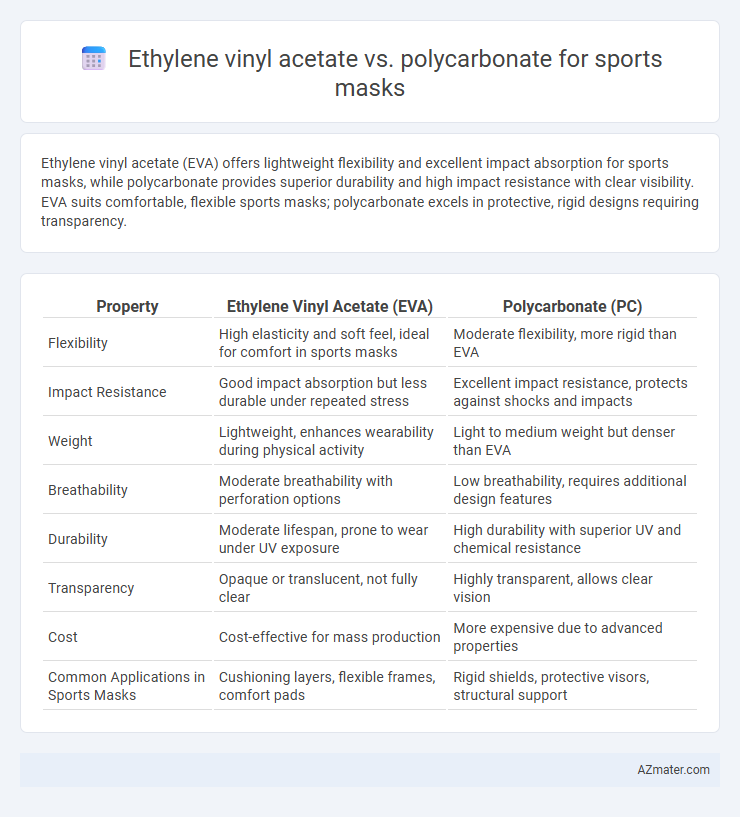Ethylene vinyl acetate (EVA) offers lightweight flexibility and excellent impact absorption for sports masks, while polycarbonate provides superior durability and high impact resistance with clear visibility. EVA suits comfortable, flexible sports masks; polycarbonate excels in protective, rigid designs requiring transparency.
Table of Comparison
| Property | Ethylene Vinyl Acetate (EVA) | Polycarbonate (PC) |
|---|---|---|
| Flexibility | High elasticity and soft feel, ideal for comfort in sports masks | Moderate flexibility, more rigid than EVA |
| Impact Resistance | Good impact absorption but less durable under repeated stress | Excellent impact resistance, protects against shocks and impacts |
| Weight | Lightweight, enhances wearability during physical activity | Light to medium weight but denser than EVA |
| Breathability | Moderate breathability with perforation options | Low breathability, requires additional design features |
| Durability | Moderate lifespan, prone to wear under UV exposure | High durability with superior UV and chemical resistance |
| Transparency | Opaque or translucent, not fully clear | Highly transparent, allows clear vision |
| Cost | Cost-effective for mass production | More expensive due to advanced properties |
| Common Applications in Sports Masks | Cushioning layers, flexible frames, comfort pads | Rigid shields, protective visors, structural support |
Introduction to Sports Mask Materials
Ethylene vinyl acetate (EVA) and polycarbonate (PC) are commonly used materials in sports masks, each offering distinct benefits for athletic protection. EVA provides lightweight cushioning and flexibility, enhancing comfort during high-impact activities, while polycarbonate is renowned for its superior impact resistance and clear visibility. The choice between EVA and polycarbonate depends on the required balance of durability, weight, and breathability in sports mask design.
Overview of Ethylene Vinyl Acetate (EVA)
Ethylene Vinyl Acetate (EVA) is a lightweight, flexible polymer commonly used in sports masks due to its excellent shock absorption and cushioning properties. EVA's high resistance to UV radiation and chemical degradation ensures durability during intense physical activities, making it ideal for sports environments. Its breathability and hypoallergenic nature enhance wearer comfort, distinguishing it from harder materials like polycarbonate, which is more rigid but offers superior impact resistance.
Overview of Polycarbonate (PC)
Polycarbonate (PC) is a highly durable thermoplastic known for its impact resistance and clarity, making it an excellent material for sports masks requiring strong protection and visibility. It offers superior UV resistance and can withstand extreme temperatures without deforming, ensuring long-lasting performance during intense physical activities. The lightweight nature and excellent mechanical strength of polycarbonate allow for comfortable wear while providing robust barrier protection against external elements.
Breathability: EVA vs Polycarbonate
Ethylene vinyl acetate (EVA) offers superior breathability compared to polycarbonate due to its flexible, porous structure that allows better airflow and moisture evaporation during intense physical activities. Polycarbonate, while durable and impact-resistant, is a rigid thermoplastic with limited breathability, often resulting in increased heat retention and discomfort in sports masks. Choosing EVA for sports masks enhances user comfort by facilitating ventilation and reducing sweat buildup, crucial for prolonged wear during exercise.
Comfort and Fit Comparison
Ethylene vinyl acetate (EVA) offers superior flexibility and lightweight cushioning, making it highly comfortable for extended wear in sports masks. Polycarbonate, while more rigid and durable, provides a secure fit but may cause pressure points during prolonged use. For athletes seeking a balance between comfort and fit, EVA-based masks often deliver enhanced softness and better conformity to facial contours compared to polycarbonate models.
Impact Resistance and Durability
Ethylene vinyl acetate (EVA) offers excellent flexibility and impact resistance, making it ideal for sports masks that require cushioning and shock absorption during high-impact activities. Polycarbonate (PC) provides superior durability and exceptional impact resistance due to its high tensile strength and ability to withstand repeated stress without cracking. In sports mask applications, polycarbonate ensures long-lasting protection against impacts, while EVA enhances comfort and flexibility, balancing durability with wearer safety.
Weight and Flexibility Differences
Ethylene vinyl acetate (EVA) is significantly lighter than polycarbonate, making sports masks more comfortable for extended wear due to reduced weight. EVA offers superior flexibility and cushioning, which enhances fit and impact absorption during physical activity. Polycarbonate, while more rigid and heavier, provides higher durability and impact resistance but may sacrifice comfort and flexibility in sports applications.
Skin Sensitivity and Hypoallergenic Properties
Ethylene vinyl acetate (EVA) offers superior hypoallergenic properties compared to polycarbonate, making it ideal for sensitive skin due to its soft, flexible, and non-irritating nature. Polycarbonate, while durable and impact-resistant, may cause skin irritation or allergic reactions in users with sensitive skin because it is a rigid plastic that can trap sweat and cause friction. Choosing EVA for sports masks reduces the risk of skin rashes and allergic responses, enhancing comfort during prolonged wear.
Maintenance and Cleaning Ease
Ethylene vinyl acetate (EVA) sports masks offer easier maintenance and cleaning due to their flexible, non-porous surface that resists moisture and dirt buildup, allowing for simple hand washing or wiping with mild soap and water. Polycarbonate sports masks require more careful cleaning as their rigid, transparent shells can be prone to scratches and chemical damage, necessitating the use of specialized cleaning agents and soft cloths to preserve clarity and structural integrity. EVA's durability against routine cleaning methods makes it preferable for athletes seeking low-maintenance, hygienic mask options in high-intensity environments.
Which Material Is Better for Sports Masks?
Ethylene vinyl acetate (EVA) offers superior flexibility, lightweight comfort, and excellent shock absorption, making it ideal for sports masks that require durability and breathability during intense activities. Polycarbonate provides robust impact resistance and clarity but can be heavier and less flexible, potentially causing discomfort during prolonged wear. For sports masks, EVA is generally better due to its combination of comfort, resilience, and improved moisture management under high physical exertion.

Infographic: Ethylene vinyl acetate vs Polycarbonate for Sports Mask
 azmater.com
azmater.com